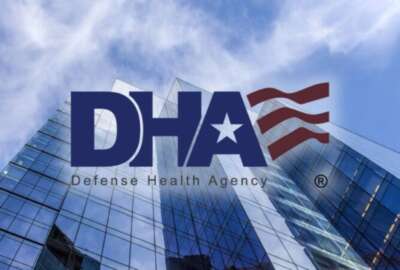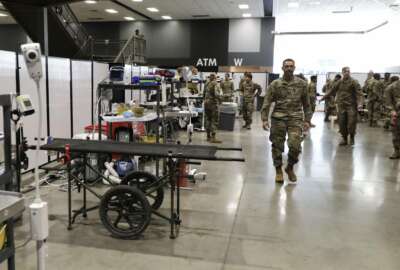DHA, AFGE cement workplace policies for 38K DoD health employees
For the first time ever, a new bargaining agreement between DHA and AFGE outlines cohesive policies on leave, work hours, official time, telework and much more.
When most agencies go to the bargaining table with their federal union, there’s already a clear starting point for negotiations. Labor and management officials usually agree to reopen a handful of articles from their existing collective bargaining agreement, then discuss and implement the various changes each party wants to make.
But for the Defense Health Agency, that’s not the case. After the agency’s employees unionized, the American Federation of Government Employees spent the better part of the last two years figuring out what employees’ rights will look like, encompassing everything from relocations and overtime work, to how to handle disciplinary actions.
“There’s no prior agreement, so you’re literally starting from scratch — you have to bargain everything for the first time,” AFGE Deputy General Counsel Cathie McQuiston said in an interview.
Although DHA employees voted to gain union representation with AFGE back in 2022, the labor and management parties didn’t open negotiations until October 2023. DHA finally reached a baseline master agreement with the American Federation of Government Employees on April 5.
The new interim agreement outlines, for the first time ever, cohesive policies on leave, work hours, official time, telework and much more for some 38,000 agency employees nationwide.
“This was a recognition for both parties, [deciding] jointly what are [the] basic matters that are important to have — rules of the road for both the union and management to follow,” McQuiston said.
DHA did not immediately respond to Federal News Network’s request for comment about the new interim agreement.
Building from an initial agreement for DHA headquarters, and with some minor tweaks, the interim contract now applies to all DHA bargaining unit employees across the country. DHA’s nationwide agreement encompasses hundreds of locations all under a single contract, similar to AFGE’s structure within the Department of Veterans Affairs.
“We had just bargained [the headquarters agreements] in the last six months, we had gotten them through agency head review,” McQuiston said. “It didn’t make sense for either side to sit down and start from scratch when we’d just bargained something … that is [already] appropriate for the agency.”
DHA employees will have “input and influence”
DHA, first created 10 years ago, initially had a fairly limited mission of offering shared services to military medical organizations. But since 2017, the agency has been growing significantly. It now encompasses practically all aspects of the Military Health System. As part of that expansion, DoD reorganized about 45,000 health care employees into DHA, most of whom were previously working for individual military branches.
An estimated 75% of employees at DHA headquarters didn’t have union representation before the 2022 election that brought in AFGE as the union representative for the employees.
“Prior to them being transferred and combined in DHA, the Army had their own rules and regulations, the Navy had theirs, the Air Force had theirs. Everybody was dealing with different rules, different policies,” McQuiston said. “Now the representation provides the opportunity for employees to engage … and have input and influence when the decisions are made, and before they’re made.”
Now with the interim agreement in place, AFGE and DHA will move forward on negotiations within the next three months, with the goal of reaching agreements on even more articles to include in the contract.
But the exact parameters of what those negotiations will entail are up in the air. That’s because AFGE is also still working on establishing a bargaining council, which will eventually comprise agency employees who will be elected as representatives of the overall DHA workforce.
“They will be responsible for doing the bargaining, making the calls on priority,” McQuiston said. “We’re right now in discussions about what articles we’ll move. We certainly want to get the views of the workforce about issues that are important to them in the workplace day-to-day and incorporate their concerns.”
Although it’ll still be a while before everything is completely set, McQuiston said she believes the representation will have a positive impact for DHA personnel, even in the short term. Under the interim agreement, DHA employees now have an official process, for instance, to flag concerns for management, and official documentation of their rights they can point back to, if necessary.
McQuistion said especially with the recent executive order reestablishing labor-management forums as a requirement for all agencies, she hopes DHA employees will have more opportunities to be involved in the decision-making process for any workforce changes from management, and to be able to offer input along the way, rather than only dealing with implementation of workplace changes after the fact.
“I think it will provide a better workplace for the employees at the end of the day,” McQuiston said. “This is a big change, it’s a huge opportunity [and] I think it’s a huge net positive for these employees.”
Copyright © 2025 Federal News Network. All rights reserved. This website is not intended for users located within the European Economic Area.
Drew Friedman is a workforce, pay and benefits reporter for Federal News Network.
Follow @dfriedmanWFED






